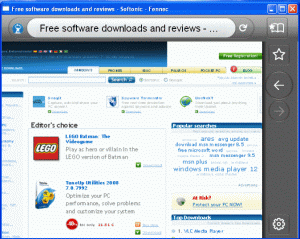 Browsing the Web on a mobile phone is traditionally such a painful process that many of us simply don’t bother. Thankfully things are beginning to change though. We’ve already seen the Beta release of the slick Opera Mobile browser for Windows Mobile and UIQ devices. Now, Mozilla is getting in on the act with its Firefox Mobile browser, code-named Fennec.
Browsing the Web on a mobile phone is traditionally such a painful process that many of us simply don’t bother. Thankfully things are beginning to change though. We’ve already seen the Beta release of the slick Opera Mobile browser for Windows Mobile and UIQ devices. Now, Mozilla is getting in on the act with its Firefox Mobile browser, code-named Fennec.
This Windows-based emulator gives you a sneak peak at how Firefox Mobile will perform. And by the look of things, it’s shaping up pretty well. Instantly, you’ll see that this isn’t merely a port of the desktop version of Firefox but rather a completely new interface designed to be used comfortably on the small-screen.
Touch-screen users will love the way that Firefox Mobile is organized. The main window dedicates pretty much the whole screen space to the web page itself rather than placing loads of tools and options on screen. In fact, the only things displayed here other than the web page itself are the large, touch-friendly address bar and bookmarks button.
Firefox Mobile avoids clutter by locking its settings in a menu that can only be viewed by dragging the screen to the right. Here, you can tinker with options for JavaScript, cookies, passwords, etc., as well as managing your plug-ins. Yes, that’s right, Firefox Mobile will be fully extensible, and this version even picks up the add-ons you’ve got installed in your desktop version of the browser.

Perhaps the feature I like most in Firefox Mobile, is the way it handles tabs. Instead of displaying tabs underneath the address bar like in normal Firefox, this version stores all your tabs in a hidden area on the left, which again, can be opened by dragging your finger across the screen – this time to the left. This is another way in which the program optimizes screen space without sacrificing functionality.
There are other features on the horizon that haven’t been wholly integrated into the Fennec alpha yet, such as quick dial for phone numbers on Web pages, and more work will be done to support maps and GPS tools. In fact, the sky is the limit really in terms of features if enough developers get excited about Firefox Mobile. Mozilla is banking on the fact that developers can build apps and add-ons freely using AJAX, CSS, JavaScript or HTML, rather than having to learn new techniques to code projects for multiple mobile platforms using multiple languages.
For now though, Fennec is a very crude version of Firefox Mobile, which is rife with display errors, bugs and feels very much incomplete. Nevertheless, if you want a sneaky peak at how the future of mobile Web browsing might look, then the Firefox Mobile emulator is worth a look.

